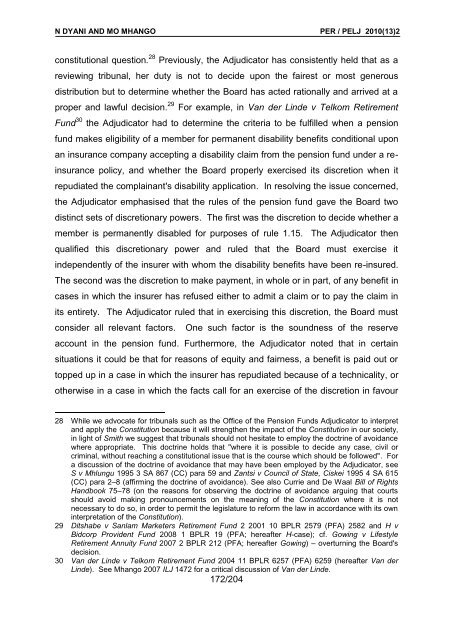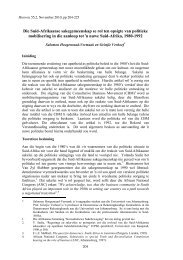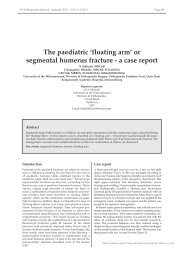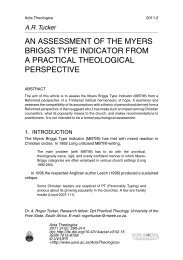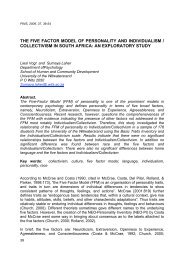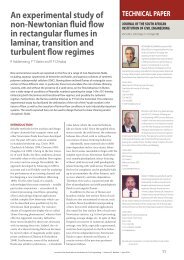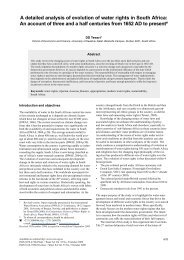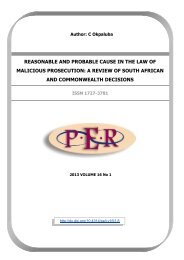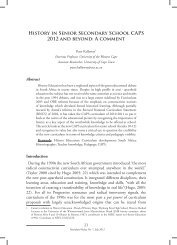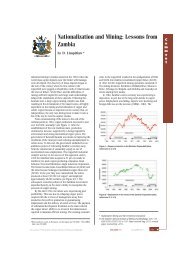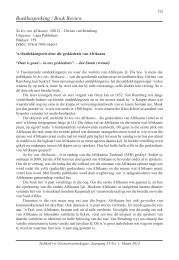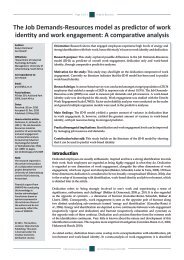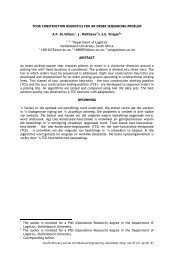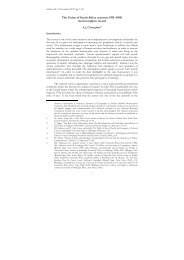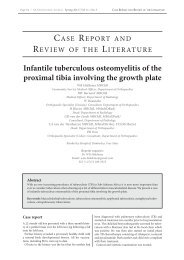how could the pension funds adjudicator get it so wrong
how could the pension funds adjudicator get it so wrong
how could the pension funds adjudicator get it so wrong
Create successful ePaper yourself
Turn your PDF publications into a flip-book with our unique Google optimized e-Paper software.
N DYANI AND MO MHANGO PER / PELJ 2010(13)2<br />
const<strong>it</strong>utional question. 28 Previously, <strong>the</strong> Adjudicator has consistently held that as a<br />
reviewing tribunal, her duty is not to decide upon <strong>the</strong> fairest or most generous<br />
distribution but to determine whe<strong>the</strong>r <strong>the</strong> Board has acted rationally and arrived at a<br />
proper and lawful decision. 29 For example, in Van der Linde v Telkom Retirement<br />
Fund 30 <strong>the</strong> Adjudicator had to determine <strong>the</strong> cr<strong>it</strong>eria to be fulfilled when a <strong>pension</strong><br />
fund makes eligibil<strong>it</strong>y of a member for permanent disabil<strong>it</strong>y benef<strong>it</strong>s cond<strong>it</strong>ional upon<br />
an insurance company accepting a disabil<strong>it</strong>y claim from <strong>the</strong> <strong>pension</strong> fund under a reinsurance<br />
policy, and whe<strong>the</strong>r <strong>the</strong> Board properly exercised <strong>it</strong>s discretion when <strong>it</strong><br />
repudiated <strong>the</strong> complainant's disabil<strong>it</strong>y application. In re<strong>so</strong>lving <strong>the</strong> issue concerned,<br />
<strong>the</strong> Adjudicator emphasised that <strong>the</strong> rules of <strong>the</strong> <strong>pension</strong> fund gave <strong>the</strong> Board two<br />
distinct sets of discretionary powers. The first was <strong>the</strong> discretion to decide whe<strong>the</strong>r a<br />
member is permanently disabled for purposes of rule 1.15. The Adjudicator <strong>the</strong>n<br />
qualified this discretionary power and ruled that <strong>the</strong> Board must exercise <strong>it</strong><br />
independently of <strong>the</strong> insurer w<strong>it</strong>h whom <strong>the</strong> disabil<strong>it</strong>y benef<strong>it</strong>s have been re-insured.<br />
The second was <strong>the</strong> discretion to make payment, in whole or in part, of any benef<strong>it</strong> in<br />
cases in which <strong>the</strong> insurer has refused ei<strong>the</strong>r to adm<strong>it</strong> a claim or to pay <strong>the</strong> claim in<br />
<strong>it</strong>s entirety. The Adjudicator ruled that in exercising this discretion, <strong>the</strong> Board must<br />
consider all relevant factors. One such factor is <strong>the</strong> <strong>so</strong>undness of <strong>the</strong> reserve<br />
account in <strong>the</strong> <strong>pension</strong> fund. Fur<strong>the</strong>rmore, <strong>the</strong> Adjudicator noted that in certain<br />
s<strong>it</strong>uations <strong>it</strong> <strong>could</strong> be that for rea<strong>so</strong>ns of equ<strong>it</strong>y and fairness, a benef<strong>it</strong> is paid out or<br />
topped up in a case in which <strong>the</strong> insurer has repudiated because of a technical<strong>it</strong>y, or<br />
o<strong>the</strong>rwise in a case in which <strong>the</strong> facts call for an exercise of <strong>the</strong> discretion in favour<br />
28 While we advocate for tribunals such as <strong>the</strong> Office of <strong>the</strong> Pension Funds Adjudicator to interpret<br />
and apply <strong>the</strong> Const<strong>it</strong>ution because <strong>it</strong> will streng<strong>the</strong>n <strong>the</strong> impact of <strong>the</strong> Const<strong>it</strong>ution in our <strong>so</strong>ciety,<br />
in light of Sm<strong>it</strong>h we suggest that tribunals should not hes<strong>it</strong>ate to employ <strong>the</strong> doctrine of avoidance<br />
where appropriate. This doctrine holds that "where <strong>it</strong> is possible to decide any case, civil or<br />
criminal, w<strong>it</strong>hout reaching a const<strong>it</strong>utional issue that is <strong>the</strong> course which should be followed". For<br />
a discussion of <strong>the</strong> doctrine of avoidance that may have been employed by <strong>the</strong> Adjudicator, see<br />
S v Mhlungu 1995 3 SA 867 (CC) para 59 and Zantsi v Council of State, Ciskei 1995 4 SA 615<br />
(CC) para 2–8 (affirming <strong>the</strong> doctrine of avoidance). See al<strong>so</strong> Currie and De Waal Bill of Rights<br />
Handbook 75–78 (on <strong>the</strong> rea<strong>so</strong>ns for observing <strong>the</strong> doctrine of avoidance arguing that courts<br />
should avoid making pronouncements on <strong>the</strong> meaning of <strong>the</strong> Const<strong>it</strong>ution where <strong>it</strong> is not<br />
necessary to do <strong>so</strong>, in order to perm<strong>it</strong> <strong>the</strong> legislature to reform <strong>the</strong> law in accordance w<strong>it</strong>h <strong>it</strong>s own<br />
interpretation of <strong>the</strong> Const<strong>it</strong>ution).<br />
29 D<strong>it</strong>shabe v Sanlam Marketers Retirement Fund 2 2001 10 BPLR 2579 (PFA) 2582 and H v<br />
Bidcorp Provident Fund 2008 1 BPLR 19 (PFA; hereafter H-case); cf. Gowing v Lifestyle<br />
Retirement Annu<strong>it</strong>y Fund 2007 2 BPLR 212 (PFA; hereafter Gowing) – overturning <strong>the</strong> Board's<br />
decision.<br />
30 Van der Linde v Telkom Retirement Fund 2004 11 BPLR 6257 (PFA) 6259 (hereafter Van der<br />
Linde). See Mhango 2007 ILJ 1472 for a cr<strong>it</strong>ical discussion of Van der Linde.<br />
172/204


